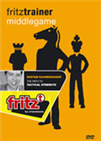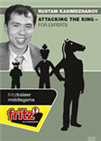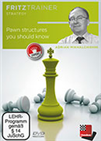Nobody said it would be easy
A big talking point after the World Championship match in London had finished with a dazzling tie-break win by Carlsen was whether chess players' strength should be assessed and differentiated according to the time control used. Some, like Nakamura, argued that the World Champion should prove he is the best player under different time constraints, while others would prefer to keep the prevalence of classical chess.
The fact that a big part of Magnus' strategy in said match was to give way to a rapid tie-break, confident that he would defeat Caruana, only demonstrates how strong the Norwegian is in accelerated time controls. His over-the-top rating record in rapid and blitz during the last few years is a testament to his high standards.
But in rapid or blitz everybody can have a bad day. Even Magnus...

Adam Tukhaev was probably as surprised as all the rest | Photo: Lennart Ootes
In the first round, he faced 30-year-old Ukrainian GM Adam Tukhaev. The 104th seed held his own with the white pieces despite having to play against Carlsen's pair of bishops. It seemed like the World Champion would eventually manage to squeeze a win in an endgame with two rooks against a queen, but when his time was running out he missed the fact that his opponent could give a perpetual check…sadly for Tukhaev, he missed it too:
 Scarcely any world champion has managed to captivate chess lovers to the extent Carlsen has. The enormously talented Norwegian hasn't been systematically trained within the structures of a major chess-playing nation such as Russia, the Ukraine or China.
Scarcely any world champion has managed to captivate chess lovers to the extent Carlsen has. The enormously talented Norwegian hasn't been systematically trained within the structures of a major chess-playing nation such as Russia, the Ukraine or China.
The Ukrainian played 72.Kh3, instead of going for a perpetual check scheme with 72.Qe4+. And here is when the shocker came, as Magnus did not manage to play 72...Rfd7 before his time ran out, despite the fact that a 10-second increment is being used in the tournament.

Signing the scoresheets | Photo: Lennart Ootes
This was not a first for Magnus, however, as he also lost his opening game last year in Riyadh — against Bu Xiangzhi.
Carlsen's next rival was 16-year-old Shamsiddin Vokhidov from Uzbekistan. A gap of almost 600 rating points did not prevent young Vokhidov from trapping Carlsen's queen in the middle of the board:
 Despite the fact that many books have been written on tactics in chess, many players still find it extremely difficult to recognise tactical patterns and calculate ensuing lines. With this disk the author not only gives a large number of examples of the most different kind, trying to cover as many ideas as possible, but also suggests a method which will greatly help you to see various tactical motives and systemise your calculation.
Despite the fact that many books have been written on tactics in chess, many players still find it extremely difficult to recognise tactical patterns and calculate ensuing lines. With this disk the author not only gives a large number of examples of the most different kind, trying to cover as many ideas as possible, but also suggests a method which will greatly help you to see various tactical motives and systemise your calculation.
The Norwegian had left the opening with a better position but did not find a convincing plan to take down his opponent. Shortly afterwards, he omitted the fact that Shamsiddin could trap his queen with 22...Bf8. Magnus played on despite the overwhelming material disadvantage but had to give up after 36 moves.

Vokhidov kept it cool and trapped Magnus' queen | Photo: Lennart Ootes
The clear rating favourite recovered some hope by winning all his three remaining games, but later declared that he "had not played this bad ever", at least as far as he can remember:
Another player known for his skills in accelerated time controls is 2012 World Rapid Champion Sergey Karjakin. The Russian finished the first day of action in Saint Petersburg half a point above Carlsen (with 3½/5), but could have easily gone into Thursday's round tied with Magnus had he not found a miracle save in round four.
 If you want to become a strong player you have to study the endgame. That's just the way it is. Andrew Martin's DVD 'First Steps in Endgames' offers a superb introduction for players rated below 1600.
If you want to become a strong player you have to study the endgame. That's just the way it is. Andrew Martin's DVD 'First Steps in Endgames' offers a superb introduction for players rated below 1600.
Maxim Matlakov obtained a massive advantage with the white pieces but missed the one trick that saved Black in the queen endgame: 86...Qe5+! — Maxim knew there was no way to avoid either a perpetual or stalemate and chose the latter by playing 87.Qxe5. Stalemate.
Alireza shows his magic
A few weeks ago, Thorsten Cmiel published an article that focuses on 15-year-old Iranian prodigy Alireza Firouzja. While Cmiel compares him with Mikhail Tal, Ivan Sokolov talks about how the youngster reminds him of Vishy Anand. It is not for us to decide who he resembles the most, but there is no doubt that we will hear his name frequently in the future.
Alireza played five enterprising games on Wednesday. First, he showed great nerves and got lucky against Denis Khsimatulin to get his first win with Black. Then, he used the pair of bishops effectively to defeat Boris Grachev. In the next round, he incidentally faced another Russian — and another 'magician' at that — as he signed his only draw of the day after 41 moves against Alexander Morozevich.

Firouzja facing Grachev while Shirov played against Hovhannisyan | Photo: Maria Emelianova
In round four, he played White against his first non-Russian, Bulgarian GM (now representing Georgia) Ivan Cheparinov and finished the game in style:
 Ever since the beginning of chess, the assault on the king has had its own special magic; masterly attacking games, crowned by sacrifices and unforgettable combinations, have never ceased to attract and thrill the audience. On this DVD in FritzTrainer video format, Rustam Kasimdzhanov shows us that particularly the World Champions were outstanding attackers from who we can learn a lot. From Steinitz, Lasker and Capablanca to Fischer, Karpov and Kasparov, one exemplary attacking game is presented reflecting the individual playing attitude of each of these chess legends.
Ever since the beginning of chess, the assault on the king has had its own special magic; masterly attacking games, crowned by sacrifices and unforgettable combinations, have never ceased to attract and thrill the audience. On this DVD in FritzTrainer video format, Rustam Kasimdzhanov shows us that particularly the World Champions were outstanding attackers from who we can learn a lot. From Steinitz, Lasker and Capablanca to Fischer, Karpov and Kasparov, one exemplary attacking game is presented reflecting the individual playing attitude of each of these chess legends.
Cheparinov resigned in view of 59.Nc5+ next — the black king is trapped in the centre and the Georgian would be forced to at least sacrifice an exchange to survive.
To finish a memorable day, Firouzja defeated third seed Vladislav Artemiev with Black. The youngster will start day two facing co-leader Dmitry Andreikin — yet another Russian.

Dmitry Andreikin flew in from Sitges | Photo: Maria Emelianova
Andreikin and Alireza are joined in the lead by Ian Nepomniachtchi, who, like Andreikin, started the tournament with four straight wins, including a victory over Hikaru Nakamura — who comes from getting an outstanding triumph at the Grand Chess Tour after precisely dominating the rapid and blitz events.
Below the three co-leaders, fifteen players are on 4/5 — the lowest rated player in this group is Croatian grandmaster Marin Bosiocic, who took down Maxim Matlakov in the final round of day one.

Nepo was in a good mood | Photo: Maria Emelianova
Standings - Open section (top 25)
| 1 |
169 |
|
GM |
Firouzja Alireza |
|
2412 |
4,5 |
3067 |
12,5 |
15,5 |
20 |
74,0 |
| 2 |
9 |
|
GM |
Nepomniachtchi Ian |
|
2771 |
4,5 |
3046 |
14,5 |
17,0 |
20 |
28,2 |
| 3 |
22 |
|
GM |
Andreikin Dmitry |
|
2725 |
4,5 |
3037 |
13,5 |
14,5 |
20 |
33,0 |
| 4 |
163 |
|
|
Bazeev German |
|
2418 |
4,0 |
2899 |
12,5 |
15,0 |
20 |
59,6 |
| 5 |
6 |
|
GM |
Mamedyarov Shakhriyar |
|
2786 |
4,0 |
2898 |
12,5 |
14,5 |
20 |
13,2 |
| 6 |
7 |
|
GM |
Wang Hao |
|
2782 |
4,0 |
2882 |
13,0 |
15,0 |
20 |
11,2 |
| 7 |
12 |
|
GM |
Kamsky Gata |
|
2757 |
4,0 |
2881 |
14,0 |
16,0 |
20 |
14,6 |
| 8 |
25 |
|
GM |
Dubov Daniil |
|
2723 |
4,0 |
2862 |
13,5 |
16,0 |
20 |
16,4 |
| 9 |
40 |
|
GM |
Zubov Alexander |
|
2681 |
4,0 |
2848 |
11,0 |
12,5 |
20 |
20,8 |
| 10 |
11 |
|
GM |
Yu Yangyi |
|
2758 |
4,0 |
2837 |
12,5 |
13,5 |
20 |
10,2 |
| 11 |
15 |
|
GM |
Korobov Anton |
|
2740 |
4,0 |
2835 |
12,5 |
14,0 |
20 |
12,2 |
| 12 |
28 |
|
GM |
Gelfand Boris |
|
2715 |
4,0 |
2823 |
13,0 |
15,0 |
20 |
12,4 |
| 13 |
31 |
|
GM |
Oparin Grigoriy |
|
2701 |
4,0 |
2819 |
12,0 |
14,0 |
20 |
14,4 |
| 14 |
26 |
|
GM |
Sjugirov Sanan |
|
2722 |
4,0 |
2816 |
11,0 |
13,0 |
20 |
10,8 |
| 15 |
13 |
|
GM |
Svidler Peter |
|
2753 |
4,0 |
2813 |
12,0 |
12,0 |
20 |
7,4 |
| 16 |
68 |
|
GM |
Vitiugov Nikita |
|
2632 |
4,0 |
2809 |
10,5 |
12,5 |
20 |
22,6 |
| 17 |
29 |
|
GM |
Anton Guijarro David |
|
2708 |
4,0 |
2808 |
11,0 |
12,5 |
20 |
11,6 |
| 18 |
95 |
|
GM |
Bosiocic Marin |
|
2584 |
4,0 |
2769 |
10,5 |
11,5 |
20 |
25,2 |
| 19 |
108 |
|
GM |
Hovhannisyan Robert |
|
2549 |
3,5 |
2841 |
12,5 |
15,0 |
20 |
38,8 |
| 20 |
2 |
|
GM |
Nakamura Hikaru |
|
2844 |
3,5 |
2803 |
13,5 |
16,0 |
20 |
-3,8 |
| 21 |
45 |
|
GM |
Shirov Alexei |
|
2674 |
3,5 |
2801 |
14,0 |
16,0 |
20 |
17,4 |
| 22 |
10 |
|
GM |
Harikrishna Pentala |
|
2758 |
3,5 |
2789 |
13,0 |
14,0 |
20 |
4,4 |
| 23 |
8 |
|
GM |
Karjakin Sergey |
|
2774 |
3,5 |
2788 |
12,5 |
14,5 |
20 |
1,8 |
| 24 |
83 |
|
GM |
Roiz Michael |
|
2611 |
3,5 |
2782 |
14,5 |
15,5 |
20 |
24,0 |
| 25 |
49 |
|
GM |
Timofeev Artyom |
|
2668 |
3,5 |
2780 |
12,5 |
13,5 |
20 |
15,8 |
All available games - Open section
Unbeatable Ju
In the women's section, only twelve rounds of rapid will be played, therefore, each of the three days will be one round shorter than the open section. No less than 124 players registered to fight for the $150,000 prize fund, with Anna Muzychuk the top seed.
Muzychuk might be the rating favourite, but Ju Wenjun will be the player to beat in Saint Petersburg. The Chinese had an amazing year: she won the World Championship twice and took both collective and individual gold medals in the Olympiad. Thus, it is not a big surprise that she is now leading the competition with a perfect 4/4.

Nothing goes wrong for Ju Wenjun | Photo: Lennart Ootes
In her round-two game against Zenab Mamedjarova, a balanced position turned into a disaster for White, as Ju Wenjun's central pawns stormed down the centre of the board:
 Every pawn structure has its typical plans and to know these plans helps you to find your way in these positions. On this DVD Mikhalchishin presents and explains the most common central structures: The Hedgehog, the Maroczy, Hanging pawns and the Isolani.
Every pawn structure has its typical plans and to know these plans helps you to find your way in these positions. On this DVD Mikhalchishin presents and explains the most common central structures: The Hedgehog, the Maroczy, Hanging pawns and the Isolani.Rapid specialist Valentina Gunina was the Chinese's last victim — Gunina had obtained three straight wins before going down against the sole leader. Six players make up the chasing pack on 3½/4 points.

The playing hall | Photo: Lennart Ootes
Standings - Women's section (top 25)
| 1 |
2 |
|
GM |
Ju Wenjun |
|
2584 |
4,0 |
3150 |
8,0 |
8,5 |
20 |
17,2 |
| 2 |
1 |
|
GM |
Muzychuk Anna |
|
2595 |
3,5 |
2696 |
8,5 |
9,5 |
20 |
7,4 |
| 3 |
16 |
|
GM |
Tan Zhongyi |
|
2442 |
3,5 |
2691 |
7,5 |
8,5 |
20 |
21,0 |
| 4 |
8 |
|
GM |
Muzychuk Mariya |
|
2493 |
3,5 |
2665 |
7,5 |
9,0 |
20 |
13,2 |
| 5 |
30 |
|
IM |
Saduakassova Dinara |
|
2381 |
3,5 |
2660 |
9,5 |
10,5 |
20 |
24,6 |
| 6 |
14 |
|
GM |
Stefanova Antoaneta |
|
2466 |
3,5 |
2642 |
7,0 |
9,0 |
20 |
13,4 |
| 7 |
15 |
|
IM |
Abdumalik Zhansaya |
|
2444 |
3,5 |
2588 |
8,5 |
10,5 |
20 |
10,6 |
| 8 |
26 |
|
GM |
Gunina Valentina |
|
2396 |
3,0 |
2574 |
8,5 |
10,0 |
20 |
18,6 |
| 9 |
86 |
|
IM |
Tsolakidou Stavroula |
|
2188 |
3,0 |
2557 |
7,0 |
8,0 |
20 |
38,2 |
| 10 |
6 |
|
GM |
Dzagnidze Nana |
|
2515 |
3,0 |
2536 |
8,0 |
9,0 |
20 |
2,2 |
| 11 |
29 |
|
IM |
Mammadova Gulnar |
|
2382 |
3,0 |
2503 |
8,5 |
10,0 |
20 |
13,4 |
| 12 |
11 |
|
GM |
Goryachkina Aleksandra |
|
2477 |
3,0 |
2502 |
9,0 |
10,0 |
20 |
2,6 |
| 13 |
22 |
|
WGM |
Girya Olga |
|
2425 |
3,0 |
2501 |
8,0 |
9,0 |
20 |
8,2 |
| 14 |
5 |
|
GM |
Lagno Kateryna |
|
2539 |
3,0 |
2497 |
8,0 |
9,5 |
20 |
-3,2 |
| 15 |
115 |
|
WFM |
Doan Thi Van Anh |
|
2022 |
3,0 |
2495 |
6,5 |
8,5 |
20 |
46,8 |
| 16 |
4 |
|
GM |
Kosteniuk Alexandra |
|
2540 |
3,0 |
2494 |
7,0 |
9,0 |
20 |
-3,4 |
| 17 |
10 |
|
GM |
Koneru Humpy |
|
2479 |
3,0 |
2489 |
7,5 |
9,5 |
20 |
1,2 |
| 18 |
7 |
|
IM |
Paehtz Elisabeth |
|
2506 |
3,0 |
2484 |
8,0 |
9,0 |
20 |
-1,6 |
| 19 |
18 |
|
IM |
Arabidze Meri |
|
2431 |
3,0 |
2459 |
7,0 |
8,5 |
20 |
2,6 |
| 20 |
23 |
|
GM |
Cramling Pia |
|
2420 |
3,0 |
2454 |
6,5 |
8,0 |
20 |
4,6 |
| 21 |
38 |
|
WGM |
Berend Elvira |
|
2342 |
3,0 |
2437 |
7,5 |
8,5 |
20 |
12,0 |
| 22 |
32 |
|
WGM |
Ambartsumova Karina |
|
2369 |
3,0 |
2429 |
7,0 |
8,0 |
20 |
6,8 |
| 23 |
12 |
|
GM |
Ushenina Anna |
|
2471 |
3,0 |
2410 |
5,0 |
6,0 |
20 |
-5,0 |
| 24 |
46 |
|
WGM |
Bivol Alina |
|
2314 |
3,0 |
2396 |
7,5 |
8,5 |
20 |
8,6 |
| 25 |
25 |
|
IM |
Khademalsharieh Sarasadat |
|
2402 |
3,0 |
2374 |
5,5 |
6,0 |
20 |
-2,4 |
All available games - Women's section
Time pressure does not stop the fun
A few weeks ago it was not clear whether the event would take place at all due to political reasons. However, Saint Petersburg was appointed as a last-minute host city, which could have produced a number of organisational problems. Nevertheless, things seem to be going fine, as many side events took place on the first day of action.

Chess all around | Photo: Official site
The Manege exhibition hall received the chess robot designed by Konstantin Kosteniuk — the father of former Women's World Champion Alexandra Kosteniuk — and gathered big crowds that faced the machine in groups of three, simultaneously.
Strong human players were also part of the entertainment, as grandmasters Al Modiahki, Zarnicki, Miroshnichenko, Zagrebelny, Lugovoi, and Ionov gave a simul for 120 local fans.
Links
























